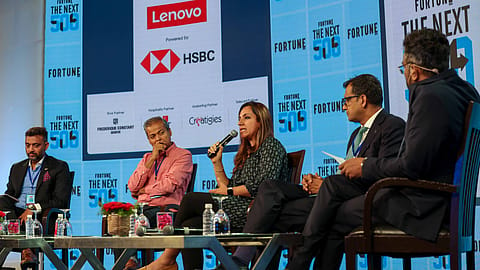Breaking New Frontiers: Level Next – Building Strong Moat Businesses
To grow and build a successful business, every business has one or two moats, says Sanjesh Thakur of Deloitte India.

Innovation, consumer centricity, network, scale and tracking mega trends early on were among the strong business moats discussed by panellists at Fortune The Next 500 Breaking New Frontiers event.
Rashima Misra, co-founder of Milk Mantra, says the time has come for the focus to shift from the economic moats to the non-economic moats, which is the human aspect. "We have to be very intentional about the culture and space and weaving in purpose in business now," Misra adds.
While talking about her startup, Misra says the idea came up when she and her husband felt there was an opportunity in India to really create a brand which would solve consumer trust deficit with food.
"In 2009, more than a decade ago, there was no differentiation. A fundamental commodity like milk was highly commoditised. So we felt there was an opportunity to create, at the front-end, a mass premium consumer brand and have strong linkages across the supply chain, own the supply chain, and set up a company which will be enthused with purpose and on the principles of conscious capitalism," she adds.
"Dairy is a $50 billion category in India. It involves a thousands of people both at the front-end and back-end. It is a daily consumption item. It is close to every family. It has the power to impact the marginal farmer," says Misra. "Most of the farmers in India are crop or paddy farmers. They work the whole year sowing the soil in the hope that they have a good harvest and they earn some money. We all know it depends on a lot of things. There are middlemen and there are vagaries of nature. It's like a lottery."
Meanwhile, Lalit Agarwal, managing director at V-Mart, believes that being customer-centric is the most important moat. "The concept is not to sell cheap products. Value doesn't mean cheap. Value means value of the material per rupee, value of the experience per rupee for the customer. Innovation is doing that on a larger scale, doing that along with digitalisation, keeping that basic instinct alive and understanding the aspiration of people very well," Agarwal says.
"You needs to constantly innovate the way you manage your business, manage your organisation, manage your fund flow, manage your investors. You need to build processes, people, technology and innovatively align them so that you are able to take your journey from here to there. The key mantra can't be only the product or the innovation on the product. You have to be innovative in the way you manage your show where your vendors, employees and customers all create value," adds Agarwal.
Recommended Stories
To grow and build a successful business, every business has one or two moats, according to Sanjesh Thakur, partner, Risk Advisory at Deloitte India. "It could be on scale, it could be on competitive advantage, it could be on network. When I look back in time and when I talk about network, I think Jio was a classic example of cost and network. But fundamentally, I think the way you scale up a business remains the same," says Thakur.
"If you look at how you protect and defend your turf, the moat remains the same. The way you apply it today becomes very different. It's not fair to say I am a successful business so I don't need to do much. In my wisdom, when I see companies through the other lens. The challenge is if you take your eyes off innovation," adds Thakur.
Nikhil Singhal, director and head of Top Tier Business at HSBC India, says that one strong moat would be reading the mega trends early on. "How does it impact your specific industry? You've got to embrace them, whether it is ESG, they are all here to stay. They are going to be massively disruptive. They are also going to create huge wealth," says Singhal.
"In terms of banks, sustainability risk is here to stay. Right now the banks don't attach a premium to it. So, polluting or non-polluting, it's not a big difference. But it's a matter of time when there will be penal clauses potentially lining up," Singhal adds.
(INR CR)